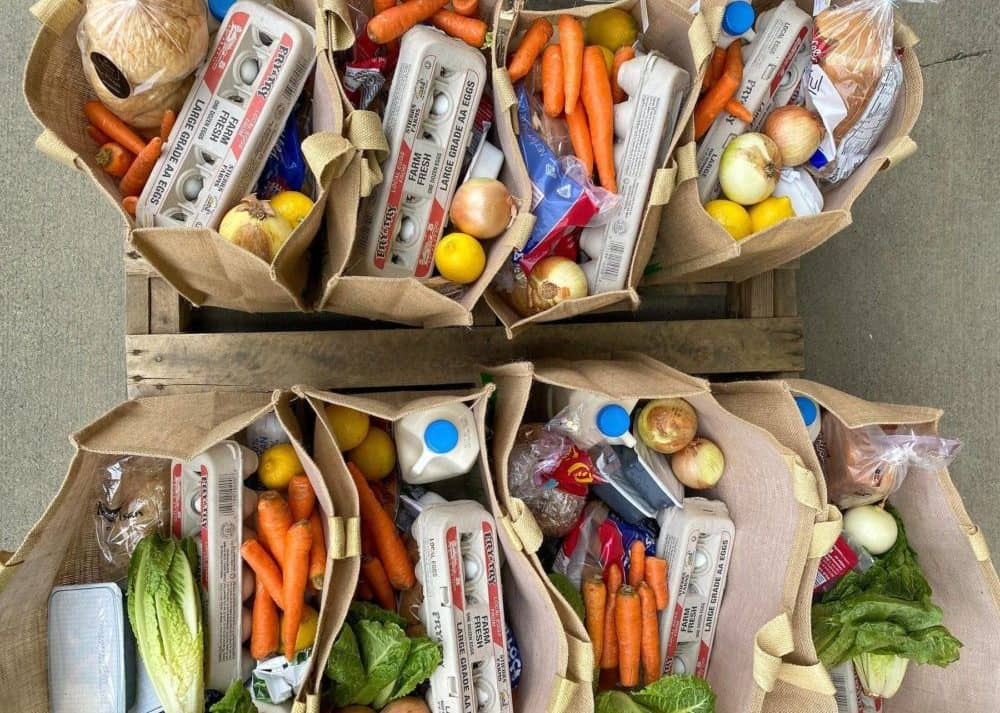
BY PEPPER FISHER
PORT ANGELES – The Port Angeles Food Bank and Sequim Food Bank are the joint recipients of the North Olympic Land Trust’s 2024 Farmer of the Year award.
The award honors individuals or organizations that have a lasting and significant impact on the ability of the local lands to provide for the community. In the case of the Port Angeles and Sequim Food Banks, they directly support local small farms by purchasing their produce and other goods and distributing it directly to the community, making a win/win for all involved.
It hasn’t always been so. While both organizations have long benefited from local farms donating excess harvest, that changed in 2017 when the Sequim Food Bank received USDA grant dollars that allowed them to pay farmers to grow food for their food bank. The relationships, contracts and price sheets that were developed with this grant laid the foundation of the direct purchasing program that is now the model for both food banks.
Here’s Sequim Food Bank Executive Director Andra Smith.
“In the very beginning, back when we first started this concept back in 2017, of creating purchasing agreements with local farms, you know, actually just having the farmers call us back because they thought we wanted something for free. And, finding, like, “No, we want to pay for food.” And so, you know, that whole concept of food banks purchasing food from local farms and building those relationships has been wonderful. And now we have farmers that are growing things just for us. So it takes the collaborations and the trust and efforts over the years to make this a really great program, and have local produce available for everyone.”
North Olympic Land Trust’s Lexi Wagor says Andra Smith and Port Angeles Food Bank Director Emily Dexter worked closely with WSU Extension and the state Dept. of Agriculture during the pandemic to have relief funds sent directly to communities so that they could contract directly with their local farms.
“During, sort of, the height of the pandemic when there was this increased use of the food banks, the folks from our local food banks realized that so much of their produce was coming from out of state, like the Midwest. And that our farmers were also having a hard time selling their produce because they’re often at places like the market, that they couldn’t get to. And so, they had this really wonderful collaboration that has only grown since then, and continues even past the height of the pandemic.”
These efforts paid off. This year alone, with the help of WSU Extension’s Farm to Food Bank Coordinator, there was more than $150,000 of produce and meat sourced from 35 peninsula farms and distributed through 18 different food banks and food access sites across the peninsula.
By the way, the farm-to-food bank relationship is a two-way street. As food they collect passes expiration dates, both food banks donate it to livestock farmers in the area to feed their animals. Last year, the two foodbanks combined provided over 70,000 pounds of feed to livestock farmers in the area.
Like food banks around the country, Port Angeles and Sequim food banks have seen the demand for their services increase since the pandemic. And Smith says the need is heightened going into the holidays.
“As we move into the holiday season, the Sequim Food Bank has a family holiday box distribution that is next Friday, November 22 from 11-2 at Carrie Blake Park. And then we’ll do that again December, the 20th. Fixings for a holiday meal, and all of that. And then we also have other food drives and such going on throughout the season. If you’re interested in holding a food drive at your business or organization, please reach out to your local food banks and help coordinate that, because the need is great for all of us.”
Go to sequimfoodbank.org and portangelesfoodbank.org to learn more.
